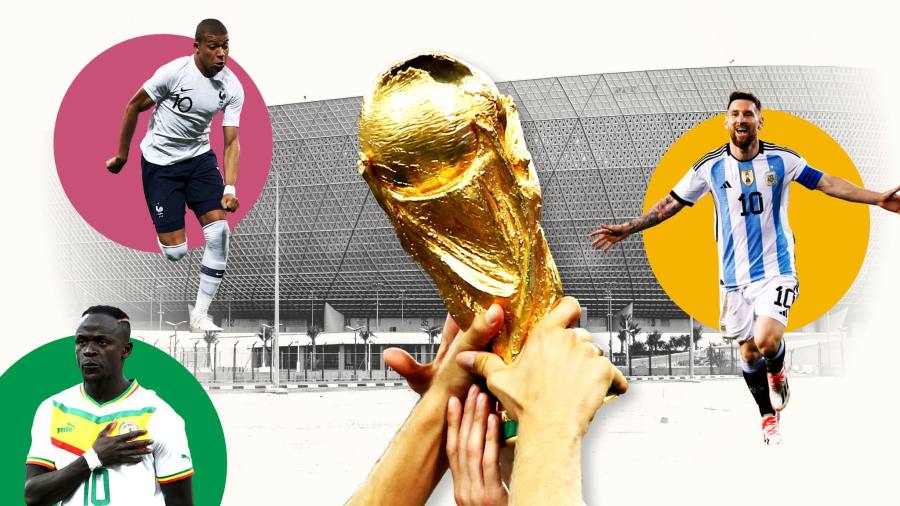
You might almost forget that there will be football played too. No modern World Cup has opened with so little anticipation of the actual matches. Most pre-tournament talk has been about Qatar’s transgressions. And for football fans, the club game reigned supreme until last Sunday.
But I arrived in the Gulf state intending to enjoy the football, while my colleagues keep reporting on human rights abuses. The trick is to hold two thoughts in our heads simultaneously: not to let the absolute monarchy’s attempted sportswashing succeed, while also relishing the sport. This is the show that unites the planet, from Tigray to Addis Ababa and from Kyiv to Moscow — where the stadium that hosted the previous World Cup final is now shut off from the world. Planetary joy has not abounded lately. So who is going to win?
The bookmakers’ favourites are Brazil, followed by Argentina, and there is a case for that. The quality of Brazil’s squad is rivalled only by France’s. Leo Messi’s Argentina are unbeaten in 36 games since 2019, when they overhauled their squad after their hilariously disorderly 2018 campaign.
Yet to tip them is to ignore 20 years of western European dominance. The previous four World Cups were won by France, Germany, Spain and Italy. The only non-European country even to gain a runners-up medal in that period was Argentina in 2014.
Western Europe has pioneered modern football: a rapid collective pressing game of diagonal passing. The region’s children learn to play it from the age of six. In the continent’s big national leagues, where western European players enter as teenagers and predominate, sharing pitches with only a minority from other continents, knowhow is exchanged every week. When Real Madrid beat Manchester City in the Champions League semi-final in May, the losers go home and decrypt the winners’ secrets. And so the region’s teams advance by the week: the football of 2022 is better than that of 2021.
Teams from elsewhere do not get enough experience of playing the best Europeans, and so they often spend World Cups just getting used to the pace. No wonder several non-European teams — above all, Morocco — recruit players from their western European diasporas.
Logically, a European team should be favourites in Qatar. But it is hard to see which one. Italy, the continent’s best side when they swept Euro 2020 only 16 months ago, did not qualify. England and France have been flailing for months. Tactics expert Michael Cox, author of Zonal Marking, reached a conclusion that should reassure both countries: solidity outweighs brilliance, and form does not matter much. However, England’s historical failings and France’s wave of injuries speak against them. Germany are between generations. Spain’s wonderful passing alone probably is not enough.
Smaller European countries tend to rely on a handful of superstars in one generation. Croatia and Belgium’s golden generations are fading, and the Dutch do not have one. Portugal, the current most talented small country, are not sure whether 37-year-old Cristiano Ronaldo has become a liability.
Other continents trail. No Asian side has shone at a World Cup since South Korea reached the semis at home in 2002. Cameroon’s quarter-final in 1990 now looks like Africa’s peak, rather than the fresh dawn it seemed at the time. Reigning African champions Senegal cannot field injured Sadio Mané: how does a one-man team cope without the man? The US, in their first World Cup since 2014, and Canada, in their first since 1986, will mostly be prepping for 2026 when they are hosts with Mexico.
Beyond a handful of the knockout games, do not expect great football. Many teams here, such as Tunisia, would probably get relegated from England’s Premier League. Only a couple of national teams can match the best club sides, which can plug their weaknesses with transfers, and have training time to develop understanding between players.
Before the usual summer World Cup, teams at least have nearly a month to train together. This time they have barely a week. Players will feel as if they are opening on Broadway without a dress rehearsal. Many teams may resort to simple man-marking rather than the zonal defending seen in leading club football. Few will develop complicated presses or sophisticated dead-ball routines. The team that might look most like a team is Qatar, the only country playing its first World Cup: its players have been training together for months.
If the football disappoints, the migrant horror stories mount up, and Qatari security guards keep providing must-watch footage by harassing western journalists on camera (authorities have apologised for the incident). This could be the tournament that endangers the World Cup’s pre-eminence.
So who will win? Well, given the relative mediocrity of the football, the World Cup’s unpredictability is half the fun. In a season-long league, the best team usually prevails, but luck matters more in knockout tournaments — especially World Cups, where there is no return leg to let the stronger side make up for a bad night. A ball that bounces in rather than out off the crossbar can change history. If I had to pick a winner, I still would not.